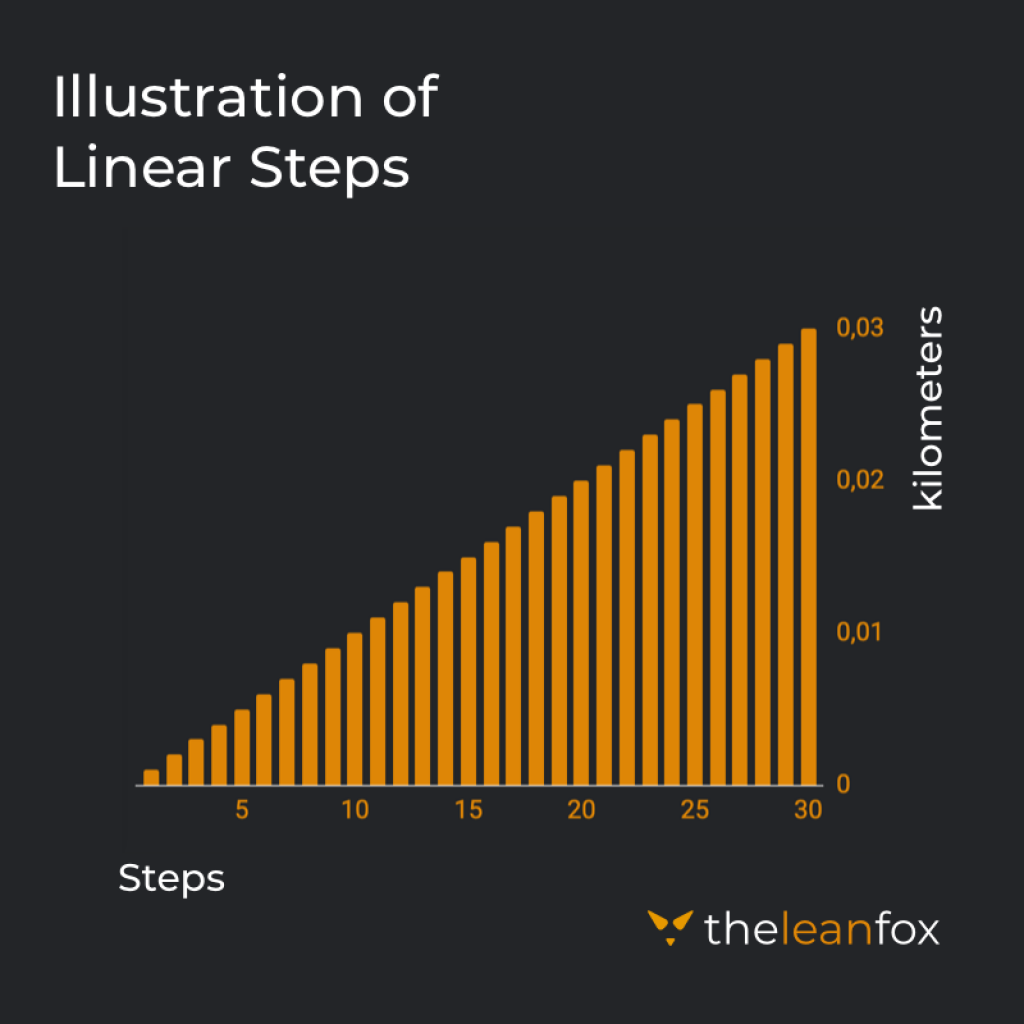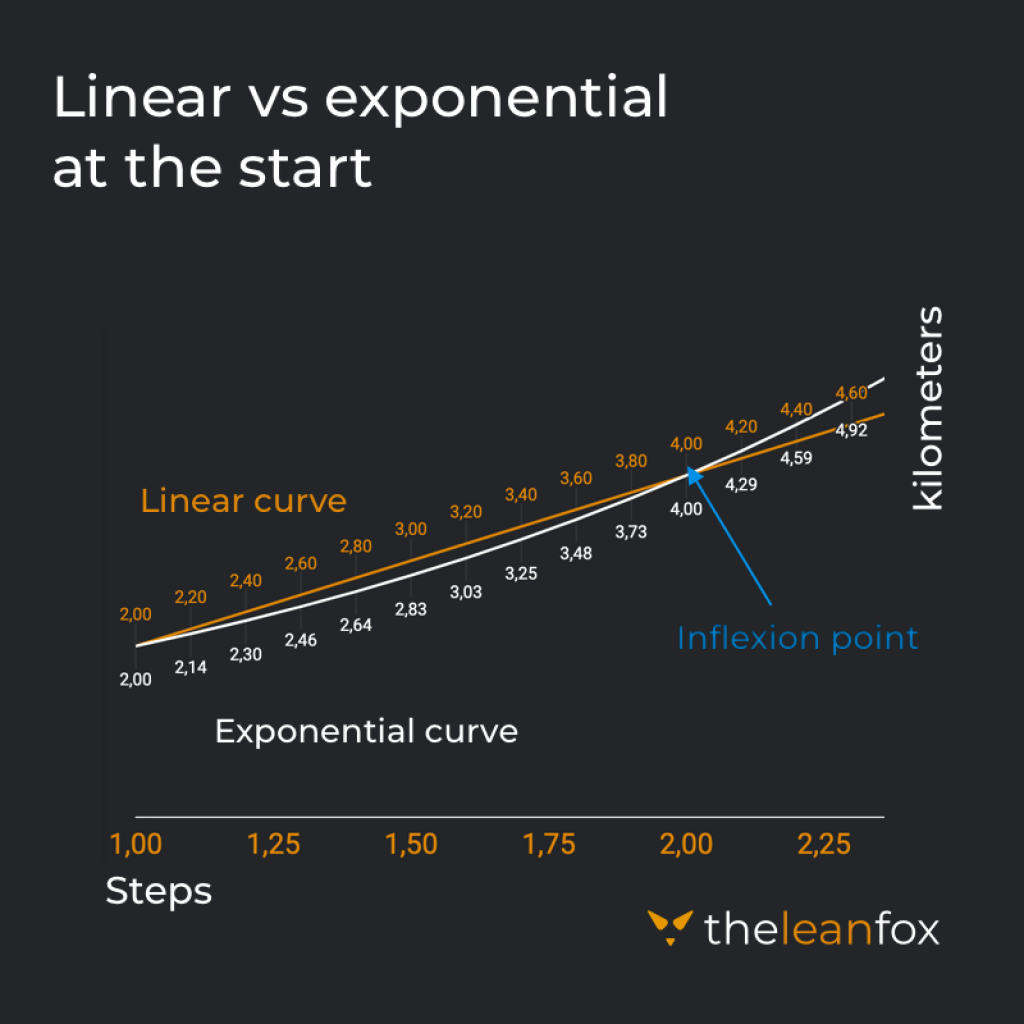Change is happening, everywhere. And the pace of the evolution is increasing.
The progress of IT is redefining our World, our societies, are companies, our families, and our roles as individuals.
Every industry affected by the digitalization is going to move from linear expansion to an exponential one.
Understanding exponential change is beyond the capability of the human brain
We are a species that understand linearity.
A good example to illustrate that concept is the walking in exponential vs. linear steps.
Imagine in the first case that you take one meter steps. After 30 steps, you’ll have reached a distance of… 30 meters… which is probably the distance between your bedroom and your mailbox in the garden. Check out the graph below.

Now imagine that every step, you double the length of your step. First step would be 1 meter, second step 2 meters, third step 4 meters, and so on.
After 30 steps, you will have reached a distance of… 1 073 743 kilometers… which is 2.7 times the distance between the Earth and the moon (340 400 km), as you can observe on the graph below.

This concept is really mind boggling, and we cannot adapt to that understanding.
Moore’s Law
Since 1965, the computing power has been increasing with a similar rate.
It was first observed by Gordon Moore, the co-founder of Fairchild Semiconductors and CEO of Intel. And it was later called Moore’s Law.
That observation showed that the number of transistor on a microchip was roughly doubling every 24 months. Later on, it changed to 18 months, but that rate remained the same until now.
How it affects industries
The cost of sequencing the genome has been going from millions of dollars in the early 2000s to a few dozens nowadays. It has been exponentially reduced.
Same goes with the cost of solar panel cells, or the cost of lithium ion batteries. The same goes for numerous cases.
These dramatic changes completely redefine the paradigms of our industries. They will change how we do business, and how we live.
This is how the first car company created in the US since the beginning of the last century went from inexistent to being a pioneer in electric car manufacturing, autonomous driving, and soon robot taxi is less than 20 years.
Every time the computing power effect is applied to an industry, it then evolve in an exponential manner. It could be with artificial intelligence, robotics, cloud computing, and other technologies.
We get the timing wrong
When you observe the exponential curve, you can see that for a long time, the exponential curve is not moving much, and remains under the linear curve.
However, at a certain point, it rises abruptly and evolve in an almost straight vertical line. You can see that at the inflexion point on the graph below.

This phenomenon explains why we over estimate the short term change but under estimate the long term change.
And once the exponential part of the curve kicks in, it’s too late to take any action.
Workers will be deeply impacted
For us living in the 21st century, the change will impact us with the change of nature of our work, and the speed at which it will happen.
Here is a – non exhaustive – list of guiding questions that will determine the jobs that will be affected:
- Can it be automated by a computer?
- Can it be done by a robot?
- Can it be replaced by a different way of doing it?
Can it be automated by a computer?
If your work is repetitive, e.g. that you process documents, move information as a middle man between people, chances are your job will be replaced by automation.
The middle man will be cut since information technology allows an effective way to communicate the information from one person to the final recipient.
Examples of jobs like inputing accounting lines into the ERP system, notary, real estate agent may be partly or wholly replaced by computer automation.
Can it be done by a robot?
Robots will continue to take a place in our daily life. This is the most straight forward approach.
Do you repeat the same movements, such that a machine can learn the basics and exceptions? This can be for instance, a combination of advanced robotics, and artificial intelligence.
Tesla has announced the production of a semi-truck with autonomous driving. Same goes with the Robot Taxi they intend to create with their fleet of vehicles.
If you’re a truck or taxi driver, you might be out of business soon.
Can it be replaced by a different way of doing it?
Not only some jobs will be deemed unnecessary, some others will bluntly be automated, but there may be smarter way of doing what you are currently doing, and it will make your job irrelevant.
With the emergence of 3D printing for instance, some manufacturing jobs will be suppressed. Example of welding, producing of standard profiles of materials, will be directly removed.
If you’re a spare part reseller, involved in the logistics of moving parts around from suppliers to customers, you might not be required any longer. The pieces will be sent by computer and made on site without transport with the help of a 3D printer.
Another example is the narrow specific type of surgery, that is only available in few locations. It costs millions to have access to such surgeons, including the travel, the equipment required, and the follow-up post procedure.
Thanks to the progress of robotics, the surgeon will be able to operate remotely, in ideal conditions. If your specialty within surgery is common and can be imported, it will be.
What attitude is required for such a change
As we saw, the change will happen, and faster than ever.
There are two different mindsets that will separate the person with success, and the one with failure.
Refusing the change is fatal
As human, we are wired to fear and refuse the change. Testing new things has saved us in the past from dying from this poisonous plant in the savanna.
In the case of the workplace, denying the possibility that your job will be replaced is taking a chance to be irrelevant.
Look at Kodak, when numeric cameras came. Or Nokia when the iPhone came…
Having a negative attitude, your boss will not make you part of the change. You will be deemed old school, and be considered as the person who do not want to learn and evolve.
In the last 50 years, you would start to become “old” in your work after 50/55 years old, now, this may occur quicker.
Embracing change is a blessing
If you dare to look at things positively, you may take part in adventures that will lead to fruitful opportunities.
Millions of jobs will be created in new disciplines. New industries will emerge.
If you adopt an attitude that embraces change, your radar will be activated. Opportunities will arise. Things you didn’t know exist will excite you.
Your boss will choose you to be part of the evolution in your organization. You will not be a passive victim. You will be an actor. You may even lead that change. And you will do it in your own way.
Being a constant learner
After the Second World War and until a few years ago, you would choose a good university, get a good degree, and be set for life in terms of education.
You might have evolved to management position that required a different set of skills, but you may have succeeded with simple company-provided training, or by simply “winging it”.
Jobs are now evolving fast, and you need to be constantly learning new things. The work you’re doing today will be done differently tomorrow.
Always look out for improvements
As per today’s technology levels, what a machine can’t do is improve its own work. This is only possible in a limited way through deep learning.
One thing that will set you on the path to success is to always seek out smarter, faster, stronger ways to do a better job.
This creativity and curiosity is critical.
Because people around you want to take your job and your market share.
They are ready to work twice as many hours, with lower pay, lower working conditions than you.
Have a strong ambition
The best way to avoid being a victim of change, is to have a strong ambition.
If you build the courage to make meaningful, bold change, you will never fear to be replaceable.
Because you will not worry about being caught up by any competition.
Doing something different is risky, but it creates a new world, that only you define and evolve, in your own terms.
In a nutshell
There has always been disruptions in economies, entire civilizations disappearing. It will continue, but at a faster pace.
People who were willing to take risks, be creative, and learn new things every day made it to the other side, and even created opportunities for themselves and others.
We need to be positive, creative, have the right attitude, and look out for the right new opportunities.
Because of the exponential nature of the pace of the evolution, we need to be constantly reading about the state of things, and avoid being caught by surprise one morning like Kodak or Nokia.
If we adopt a mindset of passion, and of courage, we will take on challenging projects, and we will never fear to be irrelevant.






